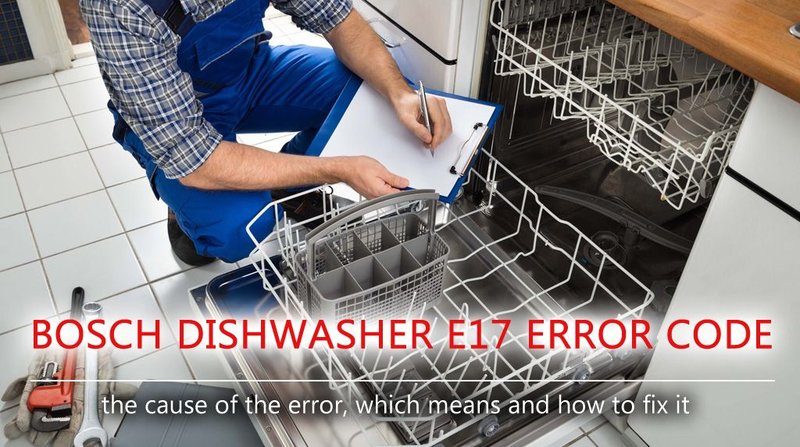
The “He” error code on Bosch dishwashers typically indicates a heating issue. It might seem like a minor inconvenience, especially if your dishes appear clean without hot water. However, neglecting this warning is much like ignoring the check engine light in your car — it might not stop you immediately, but it can lead to bigger problems if left unchecked. Before we dive deeper into whether this is something you can ignore, let’s explore what this error truly means.
Understanding Bosch Dishwasher Error Code He
So, what does the “He” error code really tell us? At its core, this code signals that there’s a problem with the heating element or the temperature sensor in your dishwasher. Think of the heating element as the part of your dishwasher that acts like a hot water kettle, warming the water to effectively clean and sanitize your dishes. If this element fails, your dishwasher will struggle to heat the water properly, leading to less effective cleaning.
Now, let’s make this a bit clearer with a simple analogy. Imagine trying to wash greasy pots and pans with cold water. It doesn’t quite do the trick, does it? That’s essentially what your dishwasher is trying to do when it’s unable to heat the water. Moreover, this lack of hot water can impact the drying cycle results, leaving you with soggy dishes that aren’t quite up to standard. This could lead to a frustrating cycle of rewashing dishes by hand, wasting both time and resources.
Ignoring the error might seem tempting, especially if your dishes appear “clean.” But consider this: without proper heating, your dishwasher can’t sanitize effectively. This leaves behind bacteria and germs, which is especially concerning for households with small children or individuals with compromised immune systems. Thus, it’s crucial to understand the underlying causes and take appropriate action.
Common Causes of the “He” Error Code
Let’s break down what might cause your Bosch dishwasher to flash the “He” error. Often, it’s due to a malfunctioning heating element. Over time, the element can burn out or develop a fault, much like a light bulb that suddenly goes out. Alternatively, the thermostat, which regulates the water’s temperature, could be on the fritz, misreading the actual water temperature and preventing proper heating.
Another potential culprit is a faulty wiring connection. Just like a loose outlet at home can cause your lamp to flicker, loose or damaged wiring can interrupt the flow of power to the heating element. This disruption means that the element isn’t getting the energy it needs to heat the water. Finally, the issue might be with the control board, which can fail to send the correct signals to the heating components.
Now, you might be wondering: how do you know which of these is causing the problem? It’s often best to start with a visual inspection. Look for any obvious signs of wear and tear on the heating element or loose connections. However, diagnosing electrical components can be tricky, and it’s generally recommended to call in a professional.
Consequences of Ignoring the Error Code
Choosing to ignore the “He” error can lead to several negative consequences. First, as mentioned earlier, your dishes won’t be sanitized properly, posing health risks. Second, continued use without addressing the error could lead to additional strain on the dishwasher, potentially causing further damage and increasing repair costs.
Moreover, repeated cycles without hot water can result in buildup within the machine. Over time, mineral deposits and detergent residue can accumulate, much like plaque on teeth, leading to reduced efficiency and longevity. This buildup might eventually necessitate more frequent and costly maintenance.
Ignoring the error also impacts your dishwasher’s energy efficiency. Operating with a malfunctioning heating element can increase energy consumption, as the dishwasher may run longer in an attempt to reach the desired temperature. This inefficiency can raise utility bills and isn’t environmentally friendly.
Steps to Address the “He” Error Code
So, what should you do if faced with this error code? The first step is to run a diagnostic test or reset your dishwasher. Sometimes, the error might be a glitch, and a reset can clear it up. If that doesn’t work, inspect the heating element for visible damage and check for any loose or burnt-out connections.
If you’re not comfortable with these tasks, or if the problem persists, it’s wise to contact a professional appliance repair technician. Professionals have the tools and expertise required to accurately diagnose and fix the issue, ensuring your dishwasher returns to optimal operation.
Additionally, consider regular maintenance checks. Just like you would service your car to keep it running smoothly, performing routine checks on your dishwasher can prevent future problems. Regularly cleaning the filters and inspecting for signs of wear can keep your machine running efficiently.
Preventative Measures to Avoid Future Issues
Preventing the “He” error from occurring in the first place is always preferable. To do this, ensure that your dishwasher is regularly cleaned and maintained. Consider using a dishwasher cleaner monthly to prevent buildup and ensure all components are functioning properly. This is like giving your dishwasher a monthly health check-up to catch any issues early on.
Also, check your home’s water heater settings. If the water entering the dishwasher is already hot, it reduces the strain on the dishwasher’s heating element, prolonging its lifespan. Finally, be mindful of how you load the machine. Overloading can obstruct the spray arms and impact performance, while underloading can waste water and energy.
By taking these preventative steps, you can enhance your dishwasher’s efficiency, and lifespan, and avoid the inconvenience of error codes popping up unexpectedly. In the end, the key is to be proactive in maintaining your dishwasher to ensure it continues to serve your household effectively.